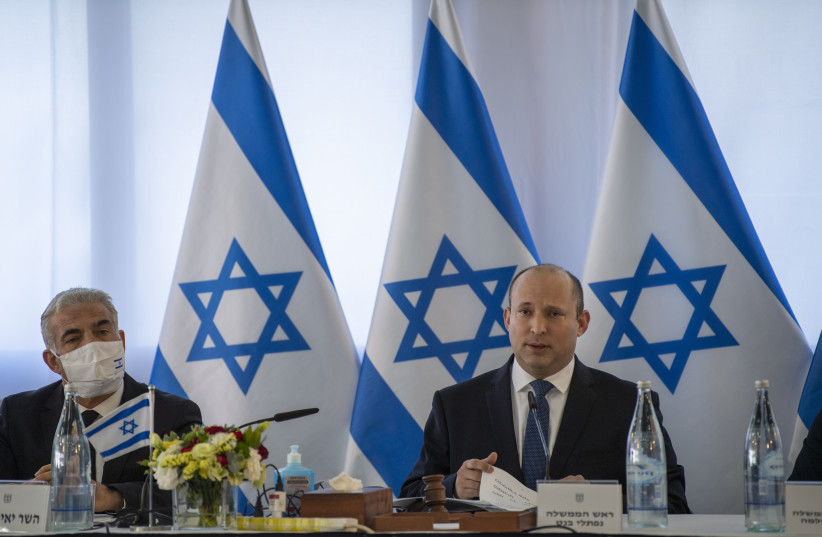The Israeli government approved a NIS 1 billion plan to develop the Golan Heights that will at least double its Jewish population and allow for the creation of two new towns in the region.
“We are making history in the Golan,” Prime Minister Naftali Bennett tweeted in advance of the vote, which took place at a special meeting at Kibbutz Mevo Hamma in the Golan Heights.
He tweeted a photograph of himself landing via helicopter on the Golan, stating that it was the “beginning of an important day on the Golan.”
At the start of the visit, Bennett said: “Friends, this is our moment; this is the moment for the Golan Heights.”
“A combination of circumstances has led us today to a dramatic government decision to channel considerable resources, around NIS 1b., to strengthen communities on the Golan Heights,” he said.

“First, it must be said, the Golan Heights are Israeli; this is self-evident,” he added.
The government’s allocation of resources strengthens Israel’s presence in the Golan Heights territory, which it captured from Syria during the 1967 Six Day War and officially annexed in 1981.
The United States recognized Israel’s sovereignty over the Golan in 2019 and is the only country to have done so. Former prime minister Benjamin Netanyahu thanked former US president Donald Trump for that recognition by creating the town Trump Heights in the Golan.
Israel has been insistent that retention of that mountain range is essential for its security, particularly given the Syrian civil war and Iran’s increased conventional military aggression toward Israel.
“After around 10 years of terrible civil war in Syria, every knowledgeable person in the world understands that it is preferable to have Israeli heights that are quiet, flourishing and green as opposed to the alternative,” Bennett said.
“The fact that the Trump administration recognized this, and the fact that the Biden administration has made it clear that there has been no change in this policy, are also important,” he said.
The goal of the development plan is to double the population on the Golan within five years, including through the construction of two new neighborhoods in the town of Katzrin and the creation of two new towns already named Asif and Matar, Bennett said.
The plan calls for a NIS 576m. investment in housing to allow for 23,000 new Golan residents. This would include the construction of 7,300 new units of which 3,300 would be in Katzrin and the remainder in the communities under the Golan Regional Council. This includes 18 moshavim, 10 kibbutzim and four towns.
Another 4,000 units would be built in the two planned new towns, Asif and Matar.
The plan also calls for NIS 160 million for transportation systems and healthcare facilities. It will also invest in education and the Odem Plan for technological-security leadership in Katzrin.
Another NIS 162m. will be allocated for regional economic development, including tourism. Some 2,000 jobs will be created in agritech, hotels, agriculture and commercial sectors, according to the government.
The Golan Heights will become the “renewal energy capital,” the government said in summary notes of the meeting. This will include investments in solar projects as well as agri-voltaic projects and research across 200 hectares.
In addition, changes in the way people in the 21st century work allow for those who work virtually to consider living in places such as the Golan, Bennett told the ministers.
“To the Israelis who are looking for a place to build their home, I say: The Heights are waiting for you; come to the Golan,” he said.
Bennett emphasized that a decision taken by this government to strengthen the Golan was a sign of how much Israeli sovereignty there was a matter of national consensus, given that his coalition represented a broad cross section of Israeli society.
“The fact that the ministers of the government are here, from Right and Left, sitting together here, is very impressive,” he said. “It is not a given.”
“The Golan Heights, the need to strengthen, cultivate and live in it, is certainly a principle that unites everyone here,” Bennett added.
Justice Minister Gideon Sa’ar said approval of the development plan marked 40 years since former prime minister Menachem Begin’s decision to annex the territory. He said Begin had clarified that the Golan would remain part of Israel even in the event that a peace deal would be reached between Syria and the Jewish state.
Syria’s claim to the Golan is based on an arbitrary decision by two colonial powers in the last century that placed its border there, Sa’ar said.
The days when a prime minister would negotiate to place the Golan in Syrian hands by writing on a napkin “have passed,” he said.
Just imagine what it would be like to battle Iran’s attempt to use Syria as a military base from which to attack Israel if the Golan Heights were in Syrian hands, Sa’ar said.
In light of the significance of the Golan for Israel, not enough has been done to promote its development, he said.
The government must approve a similar plan to develop the Galilee, Sa’ar said. “We have to bring forward a wide-ranging program for the Galilee,” he added.
Joint List MK Ahmed Tibi criticized the government decision.
“It doesn’t matter how many government meetings are held in the Golan,” he said. “It is Syrian land under occupation. All members of the coalition are responsible for the decisions made at this meeting.”
